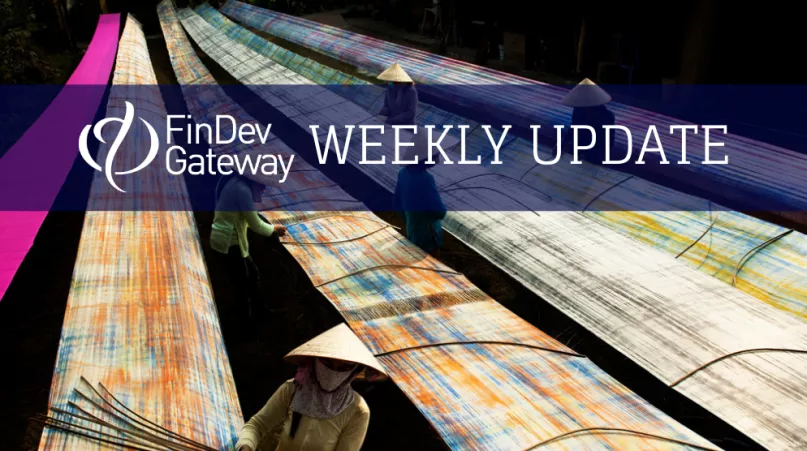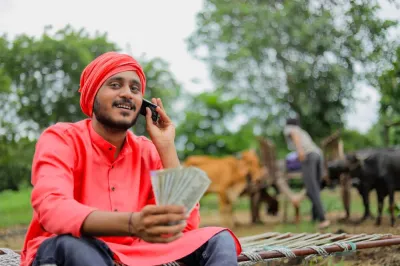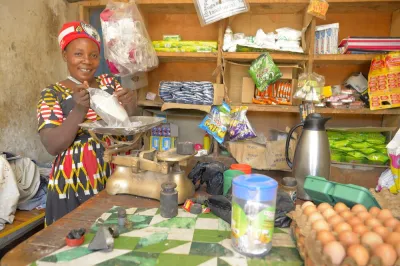COVID-19 FinDev Weekly Update #2

FinDev Gateway has created this COVID-19 weekly update with the latest and most relevant knowledge resources for financial inclusion. Below, you will find a quick summary of what FinDev editors are reading. We are also listing the most recent publications, blogs and events related to the ongoing crisis. If you have content to share in our weekly update, please submit here or contact us directly.
Sign Up to receive FinDev's weekly update in your inbox.
Weekly summary:
- Digital payments: Governments are encouraging digital payments; central banks in countries such as Kenya, Ghana, and Pakistan have adopted measures to reduce fees on mobile banking. Beyond these initiatives, however, it remains unclear how to reach nearly half of developing countries’ population who do not have access to a mobile phone or an ID. In addition, financial scams are rising, threatening to undermine trust in digital financial services.
- Remittances, which serve as a safety net for many in developing countries, are expected to decline as migrant workers in developed countries lose their jobs. Latin America could see an 18 percent drop in remittances. Lower transaction cost and faster adoption of digital financial services are considered a priority. Also, there is a concern that temporary measures to limit mobility across different countries will persist long after the crisis.
- Job losses: According to a recent estimate by the International Labour Organization, around 195 million jobs could be lost globally due to the coronavirus pandemic. The most affected sectors include retail, accommodation and food services, and manufacturing.
- Food insecurity is an emerging concern because of disruptions in labor availability and the supply chain. In many countries, social distancing is not practical as many people live hand-to-mouth and in close quarters . “Don’t ask people to stay at home unless you also tell them where their food will be coming from” was the message of the president of Fundación Parguaya, an MFI serving 70,000 clients in Paraguay. Some warn that lockdown measures could cause more harm than good.
Asia
- In China, vulnerable wage earners and the micro and small enterprises were confident about the future according to recent research by the Chinese Academy of Financial Inclusion (CAFI). Despite the inadequate cash savings and weak emergency preparedness, workers had relatively low debt ratios and, thanks to the wide coverage of social insurance, their risks remained under control. With a growing demand for digital loans, the report called for better regulation of online lending and non-bank financial institutions.
- The World Bank called for urgent financial sector measures in Asia to ease access to credit for households and maintain steady consumption. Similar measures are needed with respect to small firms to help them survive the crisis.
- Meanwhile, coronavirus threatens to deepen Cambodia’s microfinance crisis. With an estimated 2.6 million microfinance borrowers, the country has the world's highest average microloan debt per borrower.
- In Bangladesh, there are concerns that a stimulus package recently introduced by the government will not reach the informal sector which needs it most urgently given the lack of capital to recover from losses.
Sub-Saharan Africa
- In Africa, the most recent World Bank’s Africa’s Pulse recommends that policymakers focus on saving lives and minimizing disruptions in food supply chains. It also suggests implementing social protection programs, including cash transfers, food distribution and fee waivers to support citizens, especially those working in the informal sector.
- In West Africa, coronavirus is quickly spreading. The Central Bank of West African States (BCEAO) has taken measures to support its member states, notably by encouraging digital payments.
- Other countries are taking drastic measures to contain the epidemic, such as curfews in Côte d’Ivoire and Burkina Faso. However, such measures may not be sustainable, as 85 % of people across Africa work in the informal sector. Without strong safety nets, the population may not be able to bear the confinement for a long time.
Latin American and the Caribbean
- In LAC, COVID-19 will have serious economic and social consequences for the low-income clients that the microfinance sector serves. Access to financial services provided by the microfinance sector such as credit, savings, insurance and remittances is critical for poor people to cope with the fallout.
- Several MFIs in LAC have already taken measures to maintain their activities while protecting their teams and clients, and they continue to share their experiences in Portal FinDev Discussion Forum. As it became apparent in a recent webinar with more than 100 participants from the region, COVID-19 has precipitated a vigorous debate on how to find the most appropriate measures and learn from one another in order to survive the crisis.
- While in countries like Colombia, Peru and Mexico, cash is still widely used among the most vulnerable communities, the outbreak is also being seen as an opportunity to move towards building increasingly digital payment ecosystems.
Arab World
- Many MFIs in the Arab World are working to raise awareness about hygiene and disease prevention and to spread the use of various digital and mobile channels with clients and staff. Where possible, MFIs also distribute hand sanitizers and masks.
- In Morocco, an interview in French with the head of the Federation of the Microfinance Associations (FNAM) revealed the main concerns of the national network about the sector’s performance, based on the results from a recent survey. The Caisse de Dépôt et de Gestion (CDG), the state-owned financial institution that manages long-term savings has issued special measures through its affiliates Finéa and Jaïda in support of Moroccan MSMEs.
- In Lebanon, urgent government and funder support is needed for savings and insurance solutions to support low-income refugees and Lebanese households which have already been suffering from the ongoing financial crisis in the country.
- In Tunisia, seven microfinance companies are taking measures to support their clients under the guidance of the regulator (l’Autorité de Contrôle de la Microfinance) through loan rescheduling to clients affected by the crisis and the disbursement of additional funds to client projects in vital sectors.
- In collaboration with Sanabel, Microfinance Network of Arab Countries, the Arabic FinDev Gateway launched a blog series on the response of the microfinance sector in the various Arab countries to the coronavirus outbreak. The first blog article provides an overview of the situation in Egypt, which is the largest microfinance market and most populous country in the region.
Resources on FinDev Gateway and CGAP
Quick Links:
- FinDev Guide to Data - Tracking the Global Response to COVID-19
- Other Organizations Offering COVID-19 Resources Relevant for Financial Inclusion
- FinDev Discussion | COVID-19: How Is the Pandemic Affecting Your Work and the Clients You Serve?
- CGAP Collection: COVID-19 & Inclusive Finance: Lessons From Past Crises
- FinEquity: Women's Financial Resiliency as it Relates to COVID-19
- Weekly Updates
- FinDev's regional platforms offering resources in Spanish, French, and Arabic.
Blogs & Opinion
If you have a blog idea and would like to write for the FinDev Blog, please see our review our guidelines. We do not cross-post blogs that have been published elsewhere, but if you wish to share an existing blog post in our next FinDev Weekly Update, you can send it to us using our contact form.
Financial Scams Rise as Coronavirus Hits Developing Countries
David Medine | 09 April | CGAP
Three Principles to Help Financial Cooperatives Weather the COVID-19 Storm
Dave Grace | 08 April 2020 | International Credit Union Regulators’ Network (ICURN)
Flatten the Curve without Flattening the Economy: How to Stop COVID-19 from Causing Another Catastrophe for Health in Low- and Middle-Income Countries
Lorcan Clarke, Kalipso Chalkidou and Francis Ruiz | 06 April 2020 | Center for Global Development
How Should FSPs Respond to the COVID-19 Pandemic?
Mayada El-Zoghbi | 02 April 2020 | Center for Financial Inclusion
Five Ways COVID-19 is Changing Global Migration
Erol Yeyboke | 25 March 2020 | Center for Strategic and International Studies
Sector Response
How Will Last-Mile Distributors Adapt to and Survive the COVID-19 Crisis?
Emma Colenbrander | 09 April 2020 | Next Billion
Protecting Advans’ Staff and Clients During the COVID-19 Crisis
Steven Duchatelle & Grégoire Danel-Fédou |
06 April | Advans
How BRAC Microfinance is responding to the coronavirus outbreak in Bangladesh
Shams Azad | 05 April | BRAC
Continuity in a Crisis: Exploring Reactions to the COVID-19 Outbreak Among Providers of Financial Services for Low-Income Women
Andy Woolnough, and Ade Ashaye | 2 April 2020 | Women’s World Banking
When “Stay at Home” Means “Starve at Home”
Larry Reed | Soul of Finance
A Candid Discussion With Financial Sector Leaders: How Can We Support Staff, Clients and Sustain Operations in This Time of Crisis?
03 April |
Amarante Consulting
Building Resilience
COVID-19 and Fragile Places: Building Resilience to a Pandemic
Olga Petryniak & Jon Kurtz | 09 April 2020 | Thompson Reuters Foundation News
Lessons Learned from Ebola: Thoughts from the Field
Jason Hopps | IFC Inisight
Resources for MFIs and Investors: What We’ve Learned from Past Shocks and Crises
24 March 2020 | Financial Access Initiative
Digital Finance
Responding to Crisis With Digital Payments for Social Protection: Short-term Measures With Long-term Benefits
Michal Rutkowski, Alfonso Garcia Mora, Greta L. Bull, Boutheina Guermazi & Caren Grown | 31 March 2020 | World Bank
Putting Digital Payments to Work in the Time of COVID-19
Ruth Goodwin-Groen | 31 March, 2020 | Better than Cash Alliance
As Governments Turn to Digital Payments to Cushion Coronavirus’s Blow, New Report Finds Many Developing Countries Not Ready
31 March 2020 | Center for Global Development
Distribute Cash, not COVID-19: Five Ways Policymakers in Sub-Saharan Africa Can Provide Cash Transfers Safely
Martin Gould & Nate Vernon | 6 April 2020 | Next Billion
Remittances in Times of the Coronavirus – Keep Them Flowing
Alfonso Garcia Mora & Michal Rutkowski | 03 April 2020 | World Bank
Recent Publications
For a complete list of publications and to learn how you can share your research with us, visit FinDev's Publications page.
Diagnosis of the Epidemic's Impact on the Financial Health of the Working Class and the MSEs in China & Policy Recommendations
The Chinese Academy of Financial Inclusion (CAFI) | March 2020
CAFI conducted this research on the epidemic’s impact on the financial health of the working class and MSEs in China.
Migrants and the Impact of the Covid-19 Pandemic on Remittances
Inter-American Dialogue | March 2020
This analysis offers a glimpse of the potential impact of the Coronavirus Disease 2019 (Covid-19) pandemic on US immigrants and family remittances.
Sector Support
COVID19: A Framework for the Microfinance Sector
By Ira W. Lieberman & Paul DiLeo | March 2020
This note outlines a strategy for the rescue of the microfinance sector (MFS) due to distress caused by the twin health and economic crises. The strategy is based on the authors’ experience with a wide variety of economic and financial crises over the past 30 years.
Attention Points Business Continuity for MFIs in View of the COVID-19 Outbreak
ADA | March 2020
This guidance note describes what steps MFIs can take for crisis management and to ensure business continuity in the face of the COVID-19 pandemic.
Savings Groups and COVID-19
SEEP | March 2020
These recommendations will help organizations consider how best to support Savings Groups and their members during this crisis.
Digital Finance
Humanitarian Cash Transfers and Financial Inclusion
CGAP Working Paper | April 2020
This paper presents the cases of Jordan and Lebanon and highlights some of the key challenges in linking cash transfers to financial inclusion more broadly.
The Future of Government-to-Person (G2P) Payments: Innovating for Customer Choice in Kenya
CGAP Background Document | March 2020
This case study details how payments digitization was gradually introduced in the Inua Jamii, a safety net program in Kenya.
Digital Finance & the COVID-19 Crisis
By Douglas W. Arner, Janos Nathan Barberis, Julia Walker, Ross P. Buckley, Andrew M. Dahdal & Dirk A. Zetzsche | March 2020
This paper examines how the digital financial infrastructure can be leveraged to overcome the immediate challenges presented by the pandemic.
Citizens and States: How Can Digital ID and Payments Improve State Capacity and Effectiveness?
Center for Global Development | March 2020
This report considers the potential for digital technology to help reform citizen–state interactions, and to do this in a way that increases individual agency and improves efficiency in the delivery of public services, subsidies, and transfers.
Macroeconomic Impact
Africa’s Pulse: An Analysis of Issues Shaping Africa’s Economic Future
World Bank | April 2020
Recommendations for African policymakers for implementing social protection programs, including cash transfers, food distribution and fee waivers, to support citizens, especially those working in the informal sector.
East Asia and Pacific in Time of COVID-19
World Bank East Asia and Pacific Economic Update | April 2020
The report provides six main policy recommendations for countries in EAP to respond to the economic impacts of the coronavirus pandemic.
ILO Monitor 2nd Edition: COVID-19 and the World of Work
International Labour Organization | April 2020
An equivalent of 195 million jobs could be lost due to the coronavirus pandemic, according to a recent estimate by the International Labour Organization (ILO). The most affected sectors include retail, accommodation and food services, and manufacturing.
Tackling COVID-19 in Africa
McKinsey | April 2020
Offers a framework for action by governments, the private sector, and development institutions to mitigate the COVID-19 impact.
How Tax Officials in Lower-Income Countries Can Respond to the Coronavirus Pandemic
ODI | April 2020
This note examines the impact of coronavirus pandemic on revenues and lays out principles for policy response.
Macroeconomic Policy in the Time of COVID-19: A Primer for Developing Countries
Research & Policy Briefs From the World Bank Malaysia Hub | March 2020
Considers short-term and medium-term goals of economic policies in developing countries.
Economic Vulnerabilities to Health Pandemics: Which Countries Are Most Vulnerable to the Impact of Coronavirus
ODI | March 2020
A vulnerability index to examine which countries are most vulnerable to virus outbreak and a slowdown in China.
The Economic Impact of the COVID-19 Outbreak on Developing Asia
Asian Development Bank | March 2020
This brief analyzes the potential economic impact of the new coronavirus outbreak on developing Asian economies across various scenarios.
Suggestions for the Emergency
UNDP Latin America and the Caribbean | March 2020
Explores measures that LAC countries should undertake to mitigate the impact of the COVID-19 pandemic.
News & Events
For the latest news and events hosted by organizations worldwide, visit our News and Events listing pages.
For the latest news, publications, data and events, visit our FinDev COVID-19 Resource Hub for Microfinance and Financial Inclusion. Also, FinDev's regional platforms offer resources in Spanish, French, and Arabic relevant for the financial inclusion community in LAC, Africa, and the Arab world.



